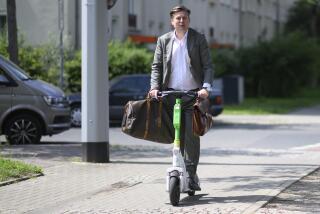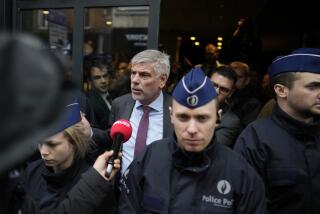Czech Communists Regroup for Elections : Prague: Political parties mushroom as Civic Forum writes election laws. The key will be which one wins Parliament in June balloting.
- Share via
SANTA CRUZ — In the second month of what has been dubbed Czechoslovakia’s “velvet revolution,” the action, though off the streets, is no less contentious. Civic Forum has won several important battles. But the Communists have not surrendered. In various mutations, they are regrouping to mount an electoral challenge that could frustrate the plans of the country’s new leaders.
The People’s Militia, the Communist Party’s private security force since 1948, has been disarmed and disbanded. But when its armory was cracked open in a munitions plant at Vlasim, a small town 25 miles south of Prague, its 98 registered submachine guns were missing.
Such episodes keep people in Prague on edge, especially after the slaughter in Romania. Civic Forum unquestionably controls the high grounds of power, including the presidency and the government, which has a non-Communist majority. More important, non-Communists control such key ministries as Foreign Affairs and the Interior.
During round-table discussions on the composition of the current government, the Interior Ministry was the chief bone of contention. Civic Forum insisted that it be headed by a non-Communist, a demand unacceptable to the Communists. The ministry was eventually put under the joint supervision of Prime Minister Marian Calfa (a Communist), Deputy Prime Minister Valtr Komarek (a Communist supported by Civic Forum) and Jan Carnogursky (a non-Communist).
But as soon as Vaclav Havel became president, he went one step further by appointing Richard Sacher, leader of the non-Communist People’s Party and minister without portfolio, to do the job. For the first time in Eastern Europe’s leapfrogging revolutions, the Interior Ministry fell into non-Communist hands.
Sacher will be looking for more than 98 missing submachine guns. Three of the ministry’s security units, totaling about 6,000 troops, have also disappeared. During the Prague Spring of 1968, no trace of a similar security force could be found. It emerged only after the Warsaw Pact invaded Czechoslovakia, having “wintered” in Poland. Preliminary reports suggest that at least one of the missing units has surfaced in Romania.
The Defense Ministry is run by the Communist general Miroslav Vacek. He is seriously committed to depoliticizing the army and is already cleaning up his top command. Even before Havel was elected president by Parliament, Premier Calfa, exercising his powers as acting president, dismissed four generals from the army’s top command, no doubt on Vacek’s recommendation.
Meanwhile, political parties are mushrooming. About a dozen have announced formation in the press, or at least on the walls of Prague’s study hall of democracy--the subway stations. The conservative Christian Democrats are the first to have won parliamentary representation. But the fragmentation of the non-Communist vote could potentially lead to brittle coalition governments. This represents an electoral danger for the non-Communists.
Another danger is the Communist Party in its several new guises. Its politicians are rudderless, but the party’s provincial apparatus is virtually intact.
The bosses in Vlasim represent the main body of the party, halfheartedly struggling with its Stalinist legacy. They still argue that demonstrating students were insufficiently beaten on Nov. 17 and encourage each other to hang in there for another month, when the tide may turn in their favor.
Then there is the Democratic Communist Forum, a “liberal” faction that might spin off as a separate, second Communist Party, possibly linking up with the Obroda (“Rebirth”) club, a political home for liberal Communists expelled after 1969.
There may even be a third Communist Party in the form of the Czechoslovak Agricultural Party. It is wooing the farm vote, roughly 15% of the electorate. Its sponsor is the behemoth agro-industrial complex of Slusovice, South Moravia, and its chairman is Frantisek Cuba. The Slusovice company was the darling of the ancien regime, managing to grow to a size unheard of in Czechoslovak agriculture, with assets of about $200 million.
Ladislav Adamec, the former Czechoslovak premier and now chairman of the Communist Party, views the Agricultural Party as his natural ally: “The fate of the Communist Party is not hopeless,” he said recently on TV, referring to the possibility of a post-election coalition with what, in effect, would be “agro-Communists.”
Even such a coalition would probably not give the Communists control over Parliament, but it could make trouble. Anecdotal evidence suggests that the countryside is more conservative than the cities. Rural chapters of Civic Forum face tough going. Keeping the pig in the sty is frequently more important than challenging the local party boss--whether clad in red or in green. The role of the agro-Communists will become much clearer in the wake of their first congress, held Saturday.
Parliamentary elections may be held on June 8, and enactment of an electoral law is expected before the end of this month. Civic Forum is unlikely to go into the elections as a political party, but the sitting Parliament will pass any electoral law that Civic Forum drafts. The conservativism of the countryside might be addressed by creating only two electoral districts for the entire country--the Czech lands and Slovakia. Civic Forum will probably wind up backing a slate of people but each candidate will appear under the name of his or her respective party.
Having won the first battle for power-sharing and the second for control of the government and the presidency, the non-Communists are unlikely to lose the third--Parliament. Then they will face the toughest battle of all: reviving the economy.
More to Read
Sign up for Essential California
The most important California stories and recommendations in your inbox every morning.
You may occasionally receive promotional content from the Los Angeles Times.













